While in Pittsburgh last weekend, we (Paul, me, the kids, and my Dad) visited the fantastic Carnegie Science Center. The Center is one of the nicest of it’s kind that I’ve ever seen, with wonderful science exhibits, an incredible under 5 play space with clever kid-sized machines, and a WWII submarine in the river. My Dad was a submarine guy in the Navy, so this was a must-see stop on our Museum tour.
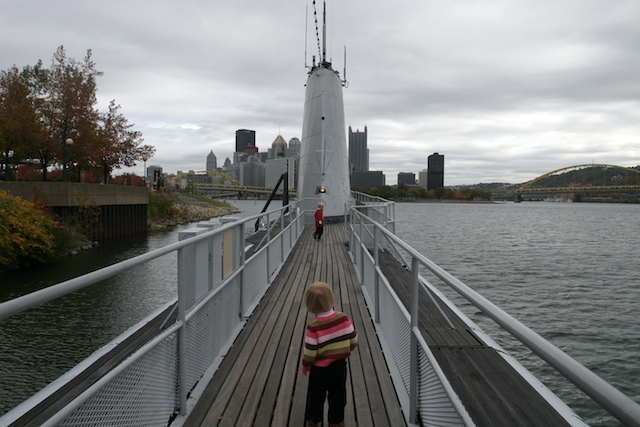
So it was interesting to visit this submarine with my Dad. (A note: the structure on the top of the hull is the sail… it’s much bigger than one would think.)
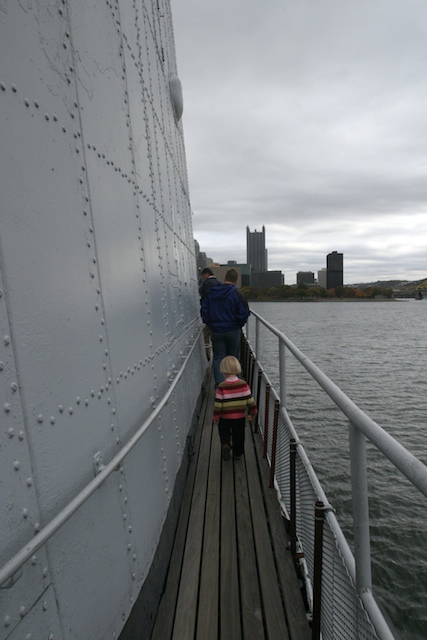
My Dad sacrificed quite a bit to work with subs. As the story goes, Dad graduated from the Naval Academy an okay student and was sent to Pensacola for flight school, where he was at the top of his class. But he wanted to go to sub school, so he applied to the Navy’s school for sub training, in Groton, Connecticut. He didn’t get in. A year went by and he applied again. He didn’t get in. At this point, his superior officer brought him in and said that the fact that their star pupil was repeatedly applying for sub school was making their flight program — in itself a top program — look bad. He delivered a warning: if my Dad were to apply again for sub school and not be accepted, they’d have to kick him out, sending him to surface duty in Hawaii (to the undesirable post no one wanted.) I was born about a year later in Pearl Harbor, which explains what happened on his third try.
So while Dad completed his long tours at sea, leaving my Mom alone with me as an infant on an island in the middle of the Pacific thousands of miles from everyone she’d ever known, he continued to dream of subs. He figured he needed more education, so he managed to get accepted (after two tries, if I remember right) to a Master’s program the Navy had with M.I.T. We moved to Boston, where my brother was born, and where Dad studied Ocean and Mechanical Engineering in between playing Candyland games with me. After three years in the program, we moved to South Carolina, where he had more surface duty and repair work. Finally, a few years into his Charleston service, he was accepted to the program in Groton. I remember visiting him at school… the drive up from South Carolina, swimming in a New England lake (it was cold and gross) and going to see Ghostbusters at a movie theatre. Once he came back from sub training, he did repairs on nuclear subs of all kinds and often went out to sea with them to monitor the repairs. Being at sea then was very different from now, with internet and phones and more detailed systems of family communications. When I was a kid and Dad was at sea, there was no contact, no information. I remember asking about where he was, wondering why we couldn’t call him or send letters. It was puzzling and we missed him. I knew that he was under the ocean, but the thought was too strange to really understand. Honestly, I did not think that it had much of an impact on me until the Kursk sank in 2000; when I had nightmares about my Dad for more than a week. I realized then that his being under the water in a silent, heavy, capsule had a great impact on me, lighting fears that I never knew I had.
So with all that history, I was excited about getting to see the sub with him. I guess I thought it might let me get a vision of what the majesty of submarining meant for him, this thing he worked so hard to be a part of — the life he led when he was not with us. A military family is a family that understands sacrifice; it’s what we do everyday. I thought maybe I’d get an idea of what that sacrifice was all about.
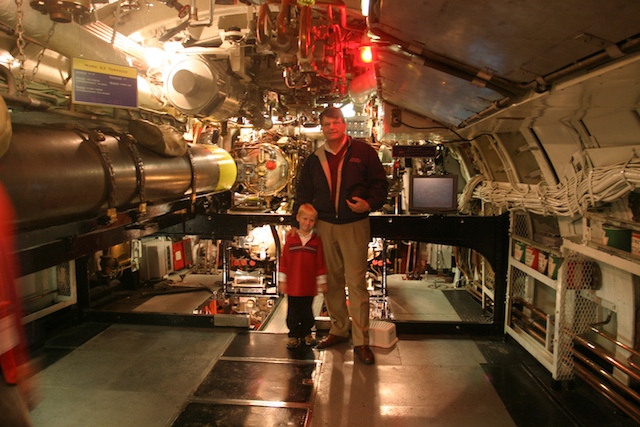
We entered in the front of the sub, into the torpedo room. A volunteer from the Center was there to answer questions; he had served on nuclear submarines, he told us through a very heavy Russian accent.
“Really?” my Dad said, “I served on many nucs, myself. Which ship did you serve?”
“I am not at liberty to say.”
My Dad looked at us with a goofy grin. He’s good with a game.
“Okay, which class?”
“No, I cannot tell you.”
“Wait,” says my Dad, “which SIDE?”
“Zee other one,” Mr. Retired Russian Submariner says. My Dad jovially answers, “Yeah, I thought so. I recognized your voice. Heard you over the radio. We always knew where you were.”
He’s joking, it’s his way of being nice and it is. Paul asks the Russian guy a thoughtful question, which he also evades, and I sort of drown out the sound. It hits me that all those days and weeks and months at sea were much more serious than I really had ever considered. It was during the Cold War. They were out listening and monitoring as War Games. My Dad is an engineer, he fixes anything that runs on water — things I had never connected with images of conflict, despite the purposes of the machines he occupied. The human weight of it, the risks, the threats, and how it fits into my love of peace… these are bigger pieces I’ve not really let myself ponder. I’d always thought of my Dad as an engineer more than a sailor, machine geek more than soldier. I wonder, is that how he saw himself, too?
Covering the walls of the torpedo room and every available space otherwise, are large cans of ketchup, relish, and chili sauce. Bright and happy cans lining shelves above huge torpedoes. Everything in a submarine is back to back on a line between what you need to stay alive and what could kill you. Even the smell of diesel, what my Dad called ‘the smell of a submarine,’ is a constant reminder of the metal at work around you. The taste of the air was like taking in a piece of the machine with every breath. I got the sense that if you were down there long enough, you would breath in so much of her that you would be forever locked in her service. Like a first love you can’t forget.
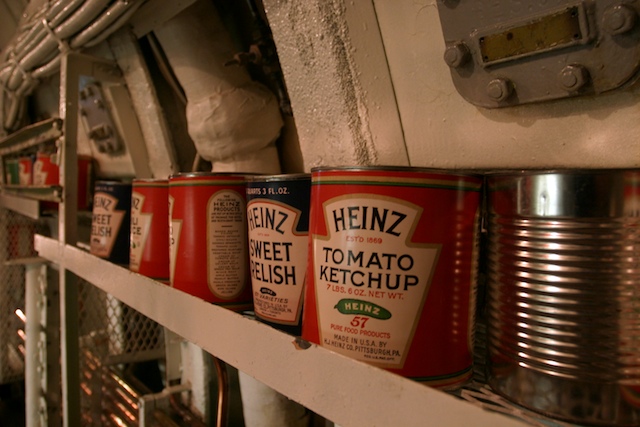
The tiny sub packed in three movies for it’s sailors to watch in the mess deck (the kitchen). They hoped to meet up with another sub to trade movies when in port… otherwise, they were back at sea with the same picks. When they grew tired of the repetition, they played the reels silently and made up alternative words (the inspiration for Science Mystery Theatre 2000). Living quarters consist of a bunk with storage under the mattress for the crew, with closet-like spaciousness for the commanding officer. My Dad is over 6 feet tall and thick with muscle; there is no where on a submarine where he comes close to fitting. I watched him struggle through the doorways and tried to imagine a hurried fleet of men rushing through during an emergency maneuver. I couldn’t.
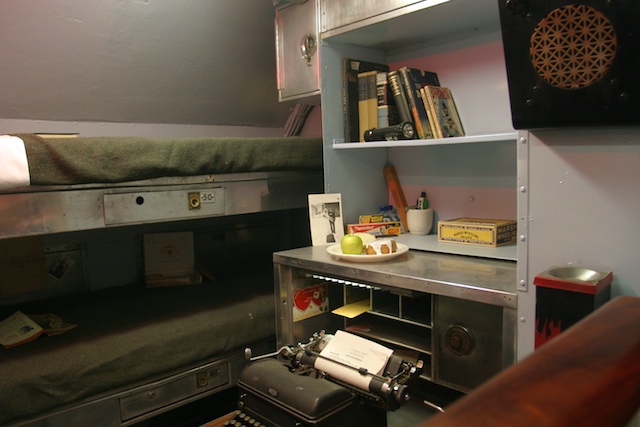
Still, he walked through that ship like a kid in a candy store. Pouring over the thousands of dials, reading the diagrams that framed the walls. I admit, the engineering of it all is astounding. But the physical experience? The heat, the steam, the sweat — all of the discomforts that were so obviously part of the experience of the men who served — if these were on his mind he didn’t share it. He seemed generally enthralled with how it all worked, how it provided the foundation for the vessels he would later repair and deploy upon.
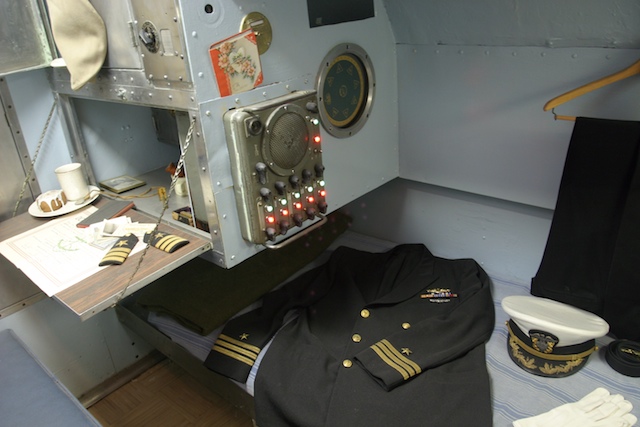
The tour gave me even more appreciation for those who go into military service, who rise to the occasion to do things that I could not bear to think about, let alone do. And an increased wonder for my Dad, this mysterious guy who worked for years for the opportunity to be a part of the most physically uncomfortable and psychologically terrifying calls to duty that I can imagine.
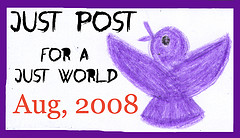

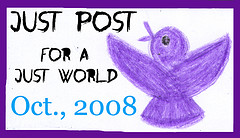






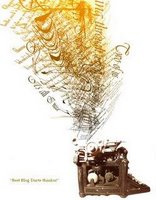





Allen | 03-Nov-08 at 10:39 pm | Permalink
Have you been with your Dad to Patriot’s Point in Charleston? There is a WWII sub there, too. If I recall correctly, one of the last non-nukes in service. It’s docked alongside the Yorktown, a Destroyer (I can’t recall the name), and a Coast Guard Cutter (again, if I recall correctly). I had a kind of rushed day there with the kids a year or two back. Maybe we’ll go again when we’re down there around the holidays this year.
Pacifism, national defense, service, war, and deterrence are all intertwined, and I struggle with the balance on occasion… It’s not as white or black (or blue or red) as people seem to like to make it. At least, not for me…
Christoph | 04-Nov-08 at 7:54 am | Permalink
Great story, Holly. Sometimes a man has to do what a man has to do.
jenny | 04-Nov-08 at 8:37 am | Permalink
very cool story, holly.
it’s amazing how quickly electronic communications have changed the whole military family experience. when my first husband was on det – in 1996 – i got an occasional call when the boat was in port. limited email access, iffy postal service.
your mom’s a strong woman to have raised two kids in a military family.
eli | 05-Nov-08 at 10:37 am | Permalink
You just made me really miss my dad. Instead of Annapolis he went to Kings Point. He did three world tours in a nuclear sub. First job stateside was at Electric Boat in Groton. It was his drives down to visit my aunt Tea and cavort in NYC that he met my mom. We luckily didn’t have the travel that you and your family had, rather we had the threat of it all the time.
What you dad so desperately wanted my dad had. It wasn’t in the end to his benefit. The insulation on all those Tridents and earlier subs was asbestos. Those guys were inhaling it left and right. Unfortunately for my dad it took hold. So your dad was “lucky” to have not been spending so much time in those subs.
BUT you did with your children what my father did with me as a child. We visited every known sub and aircraft carrier known to man between the east and west coast.
Again, thank you for a wonderful memory. You are truly lucky